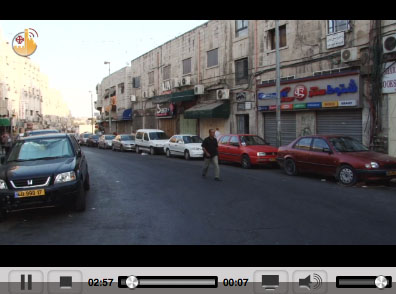
Ramadan in Jerusalem
During the month of Ramadan, the late afternoons in East Jerusalem are highly suggestive: the chaotic screaming of the vendors who usually invade the city gives way to a pervasive mood of recollection. It 's almost time to stop fasting and the last shopkeepers are closing their businesses. There are those who are shopping for the dinner and those who escort the “qatayef” the typical sweet of Ramadan – a mixture of flour and water, filled with nuts, sugar and sweet white cheese, served with the traditional juice.
“These things have a different taste when it’s Ramadan. We have them all year, but we sell much more in this month and they taste so much better when the cannon is fired.”
The day of Ramadan is punctuated by prayer and the strict fasting is understood as a deep interior purification, which is also expressed in greater solidarity with the poor. It 's a good time to approach more closely to God. This year, throughout the Middle East, Ramadan is tinged with a particular anxiety, when attention is turned to events in Syria. It is on this dramatic situation in a country not far from Jerusalem that His Beatitude, Patriarch Msgr Twal, focused his message of good tidings, saying: "May this month – the most sacred for Muslims inspire all people to work for peace and stability".
“Ramadan is the blessed month and everyone is fasting. But now the hour of Iftar is arriving, when the fast is broken. Everyone is hurrying home after buying the typical food, and I hope that next year we will celebrate Ramadan without the occupation.
It’s now a little after 7:30 PM and that's the sign which breaks the fast: the firing of the cannon situated in a cemetery near the walls of the Old City informs the entire population. At that point the Muezzin begins to chant the prayer and a festive atmosphere surrounds the whole of East Jerusalem. The streets that were quiet a little while before start to fill up again, giving an impression of conviviality that is typical of Ramadan evenings. The next morning the same streets will return to a state of reflection, immersed in that mood of recollection that only a specially sacred time like this can create. And perhaps even more, at this unique crossroads of cultures and religions.
During the month of Ramadan, the late afternoons in East Jerusalem are highly suggestive: the chaotic screaming of the vendors who usually invade the city gives way to a pervasive mood of recollection. It 's almost time to stop fasting and the last shopkeepers are closing their businesses. There are those who are shopping for the dinner and those who escort the “qatayef” the typical sweet of Ramadan – a mixture of flour and water, filled with nuts, sugar and sweet white cheese, served with the traditional juice.
“These things have a different taste when it’s Ramadan. We have them all year, but we sell much more in this month and they taste so much better when the cannon is fired.”
The day of Ramadan is punctuated by prayer and the strict fasting is understood as a deep interior purification, which is also expressed in greater solidarity with the poor. It 's a good time to approach more closely to God. This year, throughout the Middle East, Ramadan is tinged with a particular anxiety, when attention is turned to events in Syria. It is on this dramatic situation in a country not far from Jerusalem that His Beatitude, Patriarch Msgr Twal, focused his message of good tidings, saying: "May this month – the most sacred for Muslims inspire all people to work for peace and stability".
“Ramadan is the blessed month and everyone is fasting. But now the hour of Iftar is arriving, when the fast is broken. Everyone is hurrying home after buying the typical food, and I hope that next year we will celebrate Ramadan without the occupation.
It’s now a little after 7:30 PM and that's the sign which breaks the fast: the firing of the cannon situated in a cemetery near the walls of the Old City informs the entire population. At that point the Muezzin begins to chant the prayer and a festive atmosphere surrounds the whole of East Jerusalem. The streets that were quiet a little while before start to fill up again, giving an impression of conviviality that is typical of Ramadan evenings. The next morning the same streets will return to a state of reflection, immersed in that mood of recollection that only a specially sacred time like this can create. And perhaps even more, at this unique crossroads of cultures and religions.

